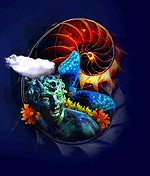|
|
I was glad that I had the opportunity to see Ilya Kaminsky read his work before I read the blurbs on the back of his book, the Tupelo Press Dorset Prize-winning Dancing in Odessa, otherwise I might have been too intimidated to write this review. When I sat listening to him for the first time, I thought to myself, “Yes, now this is poetry." And apparently, a lot of really famous poets agree with me. The blurb signatures, acknowledgments and thanks in the back of the book read like a Who’s Who in contemporary American poetry. Everyone’s there-- Carolyn Forché, Robert Pinsky, Li-Young Lee, Louise Glück, Anthony Hecht. And forget the fact that Kaminsky was only born in 1977, that English is not his first language, and that despite his marvelous sense of and obvious love of music, he lost most of his hearing ability when he was a child. Did I mention he has already won the Ruth Lilly Fellowship from Poetry magazine and somehow found the time to obtain a law degree?
Apart from this astonishing biographical information, Dancing in Odessa is an amazing collection. The book is really an integrated series of mostly long poems, “Dancing in Odessa," “Musica Humana," “Natalia," “Traveling Musicians," and “Praise." “Dancing in Odessa" chronicles the speaker’s family and homeland; “Musica Humana" is a long elegy for Osip Mendelstam, a writer who was an outspoken critic of Stalin; “Natalia" contains two love poems; “Traveling Musicians" is a series of poems dedicated to writers like Paul Celan and Joseph Brodsky; and “Praise" is a poem that tries come to an understanding about what the speaker has left behind and gained. These sectioned poems flow into one another, and range from prose sections (even recipes) to highly lyrical pieces, as the subject or narrative warrants. But the writer keeps us grounded in an earthy symbolism: watch for the connecting repetitions of raspberries, tomatoes, and lanterns. Perhaps it’s because he came to the English language late, but Kaminsky’s word choices often sound new to my ears; sometimes it’s as if when he wrote the poem he was putting together a puzzle instead of writing out speech, which has a pleasantly jarring effect.
Young poets are often advised to read the poetry of other cultures, usually for the same general reason young people are encouraged to travel: because it is assumed that reading poetry of other cultures expands the mind, helps the poet learn what poetry can and cannot do, and helps the poet better define the poetry of his or her own culture. I would say that Kaminsky expands the idea of what American poetry can do. Writing in his non-native tongue, he possesses a magical ability to make words we have grown tired of fresh again.
There are two things that make this young writer stand out from his contemporaries: He allows himself a range of emotion (including, shockingly, an unashamed sincerity) that most North American poets simply do not allow themselves to access, cutting off the extreme edges of their work. Kaminsky has lines that are howlingly funny next to lines of unspeakable horror; his invocations of romantic love are brave and sometimes goofy, just like the real thing.
Second, his scope is not limited to himself, it is sweeping--it includes not only his family, but also an imagining of the lives of other writers and people, particularly those living in the small Ukraine village that he left behind when he immigrated to America. This scope resists the smallness of mind that seems to infect so many current books of poetry, the inwardness, dullness, and misery.
This collection cannot help but make a statement about humanity, not a simplistic one, but a realistic, morally, and politically informed one, about how human beings overcome evil and hardship. In an interview with the online journal The Adirondack Review, Kaminsky says: “And, another thing--I have always complained that no one--absolutely no one--is writing happy poems these days in America. What happened? It is after all up to the writer what to leave his readers with. I want to leave my readers laughing in a poem about death and crying in the poem about weddings. Why? Because we do so constantly in our daily experience. This is the ultimate act of witnessing. If a writer is unable to witness the joy of being on this third planet of the sun, I doubt that he or she has found his or her truest vocation."
Beneath the narratives of the poems themselves is an underlying spirituality, more than the invocation of the Jewish faith of his family--a desire for goodness, a desire to see goodness, that is rare in human beings, much less poets.
One of the more moving poems in the book, especially in the wake of the Beslan school slaughter, was “Maestro," from the first section, “Dancing in Odessa":
when the schools are bombed, sadness is forbidden
--I write this now and I feel my body’s weight:
the screaming girls, 347 voices
in the story of a doctor saving them, his hands
trapped under a wall, his granddaughter dying nearby--
she whispers I don’t want to die, I have eaten such apples.
Kaminsky is graceful in the way that he juxtaposes an abstract concept (say, love) and an arresting, concrete item (say, turnips.) This works particularly well in the “Natalia" section, one of my favorites, and also when he writes about his family. From the poem “Natalia":
Late January, the darkness is handwritten into trees. As I speak of her, she sits at the mirror, combing her hair. From her hair the water pours, the leaves fall. I undress her, my tongue passing over her skin. "Potatoes!" she tells me, "I smell like potatoes!" and I touch her lips with my fingers.
These lines from “My Mother’s Tango" illustrate another example of this kind of genius:
…my mother
asks to describe the stages of my happiness--
she speaks of soups…
…But what was happiness? A pony on the balcony!
Dancing in Odessa is a collection full with ambition, intelligence, and passion; well-constructed with humor, whimsicality, and an unrelenting desire for truth. I am constantly reminded in reading this book of Voltaire’s quote: “Life is a comedy for those who think, and a tragedy for those who feel." This is poetry that walks a tightrope between edification and entertainment, between suffering and enlightened laughter. I am looking forward to reading more of Kaminsky’s work in the future.
|
|



